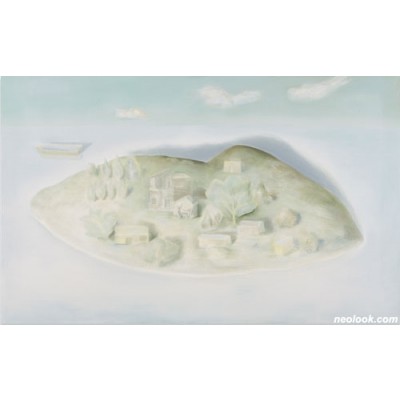실락원_Paradise Lost / 이희현展 / 아트팩토리 기획초대展
페이지 정보
작성자 art 댓글 0건 조회 5,667회 작성일 09-04-06 13:04| 전시기간 | ~ |
|---|---|
| 전시장소명 |
실락원_Paradise Lost
이희현展 / LEEHEEHYUN / 李羲賢 / painting
2009_0321 ▶ 2009_0408 / 월요일 휴관
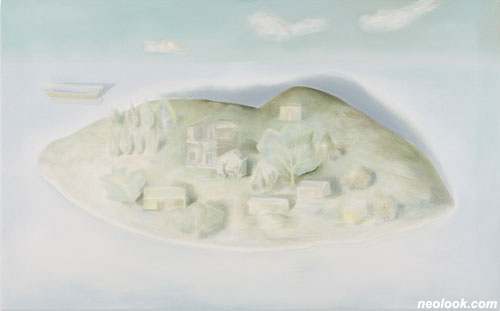
이희현_실락원_paradise lost_캔버스에 유채_73×117cm_2008
초대일시_2009_0321_토요일_03:00pm
아트팩토리 기획초대展관람시간 / 11:00am~07:00pm / 월요일 휴관
아트팩토리_ART FACTORY
경기도 파주시 탄현면 법흥리 헤이리 134번지
Tel. +82.31.957.1054
www.artfactory4u.com
망망대해를 생각해보자. 그 끝을 알 수 없는 바다와 하늘. 바로 앞을 보아도, 저 멀리를 보아도 비슷한 풍경들뿐이다. 만약 어딘가 저 멀리에서 불현듯 섬이라 도 등장했다면, 그것이 아무리 작은 것이라 할지라도 우리의 시각을 사로잡기 충분하다. 변화 자체가 허용되지 않을 것이라 여긴 그곳에서 이러한 사소한 변화는 그 자체로 거대하기 마련이다. 그 섬은 그곳이 어떤 형태를 가지고 있는지, 어떤 일이 일어나고 있는지, 누군가가 살고 있는지, 그 모든 것이 작동하는 호기심의 대상이다. 그러기에 당연지사 그 대상에 애정 어린 시선이 부여되기 마련이다.
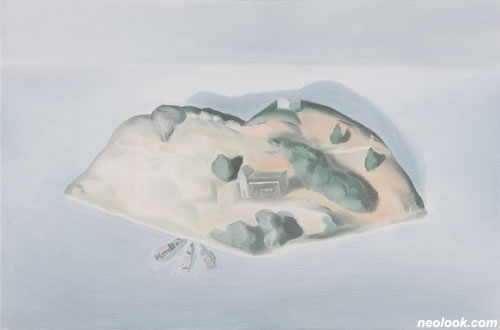
이희현_실락원_paradise lost_캔버스에 유채_61×91cm_2008
망망대해에서 발견한 섬
이희현의 작업은 마치 망망대해를 바라보듯 비슷한 색톤이 화면을 장악하고 있다. 섬을 그릴 때에도, 정물을 그릴 때에도, 인물을 그릴 때에도 그의 작업에 과하다 싶을 정도의 빈 여백이 존재한다. 상대적으로 화면에 놓인 대상은 왜소하기 짝이 없다.(그것은 크기의 문제가 아니라 화면을 장악하는 힘의 문제이다.) 그러나 망망대해에서 발견한 섬에서 알 수 있듯 우리의 시선은 사물에 천착하기 마련이다. 거대한 여백에 비하면 사소하게 보일 정도로 작은 대상(섬, 인물, 정물)이지만, 그의 작업에서 대상에 방점이 찍히는 것은 이 때문이다. 그러기에 이희현의 작업에서 주요한 것은 대상 자체가 아니라 대상에 대한(애정 어린) 시선이다. 그렇다고 그의 대상이 특이한 것은 아니다. 현실에서 손쉽게 볼 수 있는 사물(과일, 건물, 인물, 꽃 등)이다. 그리고 그것들은 정밀한 묘사를 통해 사물의 개별 의지를 온전히 지닌 현실적 존재이다.
그럼에도 풀리지 않는 의문이 있다. 그것은 화면 전체가 현실적으로 보이지 않는다는 것이다. 온전한 건물에, 온전한 동물이 뛰어 다니고, 온전한 사람이 그 공간에 놓여 있음에도 말이다. 이희현이 구축한 화면의 대상은 현실에 있을 법한 것 들이지만, 그들의 조합은 낯설다. 이것은 그의 작업이 사물 자체에 주목하기 보다는 사물과 사물들의 관계를 통해 낯설음을 드러내고 그것이 화면 전체를 장악한다는 것을 말한다. 즉, 대상의 개별적 의지는 작가가 설정한 관계에 종속되어 자신의 의지를 발현하지 못한다. 그러기에 그의 작업의 사물들은 특정한 대상이라기보다는 자신의 삶에서 쉽게 마주할 수 있는 것이다. 그 대상을 정밀하게 묘사하여 구상적 형태를 유지하고 있지만, 평범한 사물은 작가가 설정한 관계망에서 비현실적 존재로 나타난다.
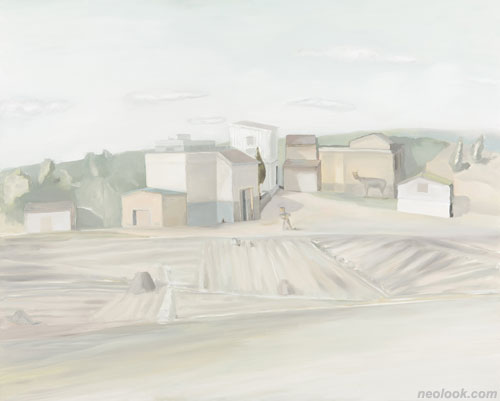
이희현_조각가 K씨 집_the house of sculptor K_캔버스에 유채_130×162cm_2008
‘현존’과 ‘재현’ 사이에 놓인 작가의 시선
당연한 이야기지만, 대상을 인식하는 방법은 자신이 의식할 수 있는 관습적 체계 안에서 이뤄진다. 그러기에 구체적 사물이 재현된 작업에서 감상자는 이미 구축된 자신의 관습체계에 따라 대상을 인지한다. 그렇다고 ‘재현’이 ‘현존’을 대신할 수 없다. ‘재현’이 ‘현존’이 아닌 이유는 대상을 재현하는 순간 재현자의 욕망이 투사되기 때문이다. 비슷하지만, 서로 상이할 수밖에 없는 운명이 재현과 현존의 사이에 놓여 있다. 그러기에 재현과 현존을 이야기할 때 중요한 것은 그들 사이의 차이를 규정하는 것이 무엇인가이다. 분명 이희현의 작업에는 구체적 사물이 존재한다. 그러나 그것은 비현실적 대상으로 구체화된다. 현실을 비현실로 만드는 지점에 놓인 것이 사물을 바라보는 작가의 시선이다.
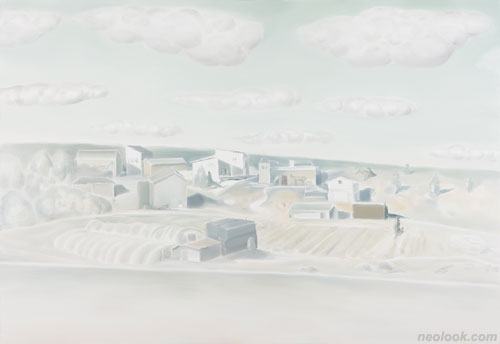
이희현_조각가 K씨 집 근방_near the house of sculptor K_캔버스에 유채_112×162cm_2008
그간의 작업에서 이희현은 과감한 프레임 상정을 통해 대상에 향하는 작가의 시선을 구획했다. 이를 통해 화면의 대상을 낯설게 잘라내어 현실을 비현실적으로 바라보는 작가의 시선을 표현했다. 그러나 이와 같은 작업은 현실의 감각보다는 비현실의 감각에 치중하여 그들 사이의 절충이기보다는 비현실에 무게중심이 있었다. 그러나 이번 작품에서는 프레임은 안정적으로 구축된다. 그리고 화면의 시점 역시 전체를 조망하는 듯 안정적 자세를 유지한다. (특히, 섬을 그린 작업의 경우 이러한 경향이 두드러진다.) 그러기에 대상 개별은 오히려 현실적으로 포착된다. 그러나 화면 전체적으로는 비현실적 대상이 된다. 이것은 사물을 바라보는 작가의 시선의 변화를 의미한다. 이전 작업이 일정 정도의 거리를 두고 관조적으로 대상을 바라보았다면, 최근의 작업은 대상과 자신이 일체가 되었다는 것(사물의 외형에 대한 탐구라기보다는 사물을 자신의 삶에 내재화 하고 있다는 것). 즉 대상에 대한 애정이 증가한 것으로 볼 수 있다.
망망대해에 떠 있는 섬은 그 자체로 시각을 사로잡는 매력이 있다. 그것은 망망대해에 떠 있는 사람이 간직한 그간의 고뇌가 그 섬에 투영되기 때문이다. 망망대해에서 느끼는 적막함이 그 작은 섬 하나를 보면서 안식(위안)을 찾을 수 있듯이, 우리 주변에 놓인 사물 하나하나가 어쩌면 우리의 고난한 삶에 위안을 주는 낙원이 아닐까. ■ 이대범
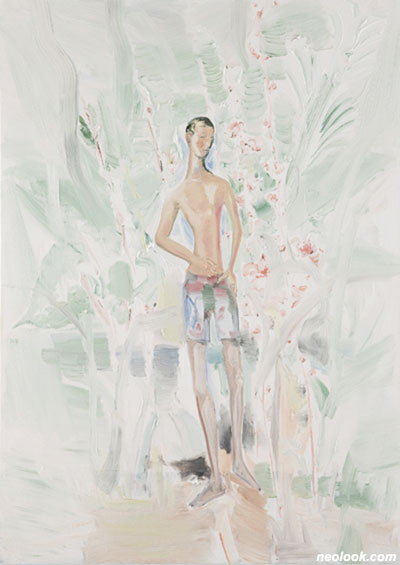
이희현_소년_a boy_캔버스에 유채_95×65cm_2008
A Paradise Lost on a Vast Ocean
Think of a vast ocean. Think of the boundless sea and the sky. The scenery just in front of you and the one which is far away would seem not much different. If something like an island suddenly appears in the scene, it surely attracts your sight however small it is. The effect of this kind of small change is huge because it is totally unexpected. You will be curious to know everything about the island such as the shape of it, things happening in it, and people living on it. It is natural that you feel and see the object with some kind of special affection.
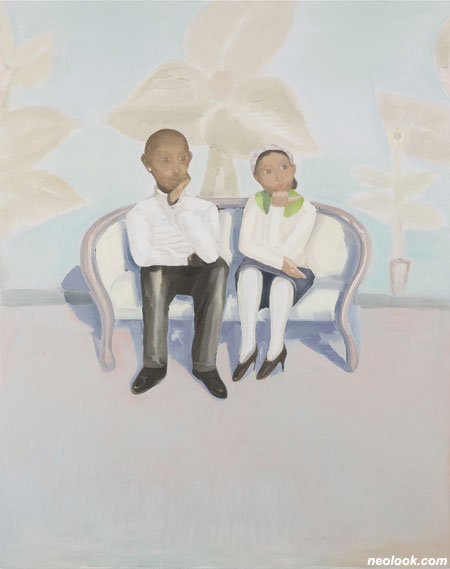
이희현_커플_couple_캔버스에 유채_139×111cm_2008
An Island Found on a Vast Ocean
The works of Lee Hee Hyun are all covered by similar tones of colors like the seascapes. Lee leaves too much blank space in his paintings no matter what subject he is depicting; an island, the still life, or a person. As a result, the subjects in his works look relatively small. (What matters here is not their actual sizes but the power they have on the picture.) However, as we could learn from case of the island found on a vast ocean, our sight tends to search for objects in a scene and stick to them. This is why the relatively small objects (island, still life, man/woman) in a huge empty space are made important in Lee’s works. What is important in Lee’s works, therefore, is not the objects themselves but the (affectionate) eyes looking at them. The objects Lee chooses are not extraordinary. They are common things (fruits, buildings, people, flowers, etc.) that we could meet everywhere. Through accurate description, each object has is its own ‘will’ and become an realistic ‘being’. Here, what is interesting is that the whole picture doesn’t seem realistic even with these ‘real’ objects -the ‘perfect’ buildings, the running ‘perfect’ animals, and the ‘perfect’ people. The objects are made realistic but their combination looks weird. This shows that the focus of Lee’s works is not depicting the objects itself but covering the whole picture with the sense of weirdness through the strange relations between the objects. The individual will of the objects cannot be manifested being involved in the network of relationships the artist sets up. That might be why Lee chooses ordinary things as subject matters. In his paintings, these ordinary objects are clearly and accurately depicted but appear as unreal beings fixed in the network that he made.
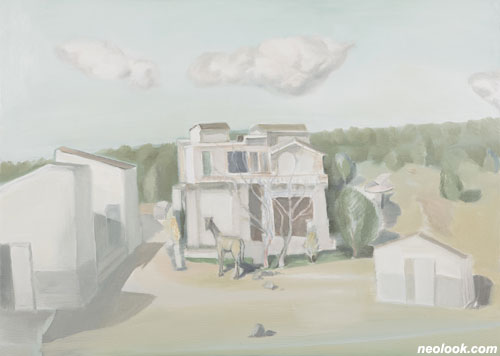
이희현_조각가 K씨 집_the house of sculptor K_캔버스에 유채_65×91cm_2008
The Look of the Artist between ‘Presence’ and ‘Representation’
As we know, one’s perception is related to the conventional system that he/she is aware of. In a work where concrete things are represented, the viewers tend to recognize the objects depending on the already built conventional system of perception. Even in this case, however, the ‘representation’ cannot replace the ‘presence’. The ‘representation’ cannot be the ‘presence’ because it reflects the desire of the painter the moment it is made. A valley of different destiny is dividing the two. Therefore, what matters here is to talk of what defines the difference between them. It is undeniable that concrete things are existing in Lee’s works. However, they are depicted as unreal objects in those paintings. What is lying at this point of divergence between the real and the unreal is the look of the artist on those things.
In paintings that he has presented until now, Lee set dramatic frame lines and marked out the range of his look toward the objects. Through this setting, Lee cut off the objects in unfamiliar ways and showed his strange way of looking which tried to see the reality in a unreal point of view. In these works, the weight was placed on the sense of unreal not on the compromise between the reality and unreality. However, in his latest works, the structure of the frame is stable and the visual point of the screen is also well-balanced. We could feel as if we are looking at the whole scenery not a part of it. (In case of the pictures of an island, this is especially remarkable.) The individual objects are captured by the artist in realistic ways. However, they seem unreal in the whole picture. This shows a change in the artist’s way of looking. In his earlier works, Lee kept a space from the objects that he was looking at and took a contemplative stance. However, he seems to have more affection to the objects and feel like being united with them in his lastest works. In short, the objects are not scrutinized by him anymore, they are internalized in him.
The island floating alone on a vast ocean attracts our attention. This is because the agony we have floating on the same vastness is reflected onto the island. Looking at the small island, we who feel the desolation from the boundless sea could find solace (consolation). Just like this, every objects we could meet near our side might give us a peace of mind and lead our troubled life to the paradise lost. ■ Lee Dae Bum
추천0
- 이전글여기, 너머에… Here and Beyond… / 김규리展 / 미디어 전문 대안공간 E-ACT 09.04.08
- 다음글<galleryyoung기획초대전>최세경 개인전 09.04.06
 admin님의개인전소식 관련글
admin님의개인전소식 관련글
- H인기글 즐거운 나의 집 04-07
- H인기글 곽경화 초대개인전-UTOPIA 04-03
- H인기글 잇다 : 자연과 인공 사이 04-03
- H인기글 CYun / I+WE 03-25
- H인기글 회복기의 노래: 중간 다지기 운동 03-04
- H인기글 《박광진: 자연의 속삭임》 12-16
- H인기글 신은섭 fine tree 올려보기 10-18
- H인기글 두 개의 태양, 두 개의 달 07-25
- H인기글 <삶 - 여정> 07-22
- H인기글 촉발 affect 소영란 07-10
